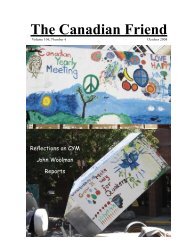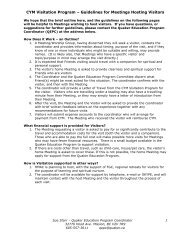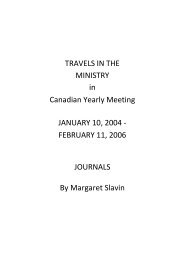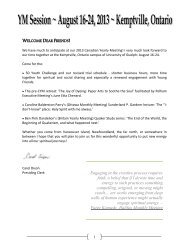Download pdf - Canadian Yearly Meeting
Download pdf - Canadian Yearly Meeting
Download pdf - Canadian Yearly Meeting
You also want an ePaper? Increase the reach of your titles
YUMPU automatically turns print PDFs into web optimized ePapers that Google loves.
Guest Writer:____________The EcumenicalChallenge John MyhillWe challenge ourselves to be open to the Lightfrom wherever it may come. Yet our pride in ourtolerance of other faiths is often little more than achild’s delight on discovering new colourful toys,previously unknown. Cultural diversity is a wonderfulbenefit of immigration. Previous generations had totravel to discover the wisdom of Native Americansor the Grand Turk. But ‘Light’ is more than culturaldifferences like clothes, food, dance and design.Are we really shaken in our beliefs by our meetingswith Muslims, Hindus or Buddhists? Or are we seeking,in the exotic of other religions, for some vitality tojustify our existing beliefs? Do the moral teachings ofour parents or teachers seem more acceptable whenexpressed in terms of karma, without the interference ofa personal God? Are we able to accept the limited placeof women and proscription of homosexuality when itis expressed by Muslims in Britain because they are adisempowered minority in our country? Why are wehorrified by similar statements made by the Christianestablishment?Ecumenical contact is far more challenging,especially as the ideas may be expressed by educatedmiddle class women who share our concerns forpeace and social justice, simplicity of lifestyle, andintegrity in public affairs. Some of these people mayknow more than we do about evolutionary theoryand yet believe in creationism. They may have lived ashomosexuals but now believe they should follow whatthey understand as Biblical prohibition. They may berespected theologians or physicists and yet believe inmiracles. Such beliefs are challenging to most Quakers.Surely we should work with these groups rather thanusing [differences] as justification for avoiding them.We seek to “answer that of God in everyone”. Ofcourse, we find no difficulty in recognizing that of Godin Muslims, Hindus and Buddhists. But I seriouslydoubt that our answer has much relevance to them.“Nice people the Quakers, friendly, careful listeners,so helpful at providing connections to other faithcommunities”, is possibly the best they can say aboutus. That in itself is a great achievement, but....I feel that among Christian groups we really areanother faith. Some believe Quakers: reject the Bible;ridicule miracles; pour scorn on the Trinity; despisesacraments; advocate feminism, homosexuality andfree love; favour Muslims over Jews; and advocateextreme left-wing politics. I can see why such astereotype might develop.Simply to rectify misapprehensions is easierand more important than attempting to correct ourimage in the eyes of other faiths; but I believe we cango much further in challenging the views of fellowChristians. Only once they accept that we are rootedin Christianity can productive dialogue begin.For example: Pentecostals need to hear about ourexperience of being moved to minister, the broadnature of ministry, the process of discernment, and thehistory of Friends. Charismatics need to experiencethe power of Quaker silence. Evangelicals need totry Friendly Bible Study and see that the context of averse is more than its connection to other verses. Thecontext is also personal discernment at a particulartime and place.There is always the possibility that we might learnfrom them! Singing is terribly good for you physicallyand emotionally and, if you cannot say some of thewords, you can use words that you feel instead as no-oneis likely to notice. Some of their music is so wonderfulthat many Friends have left the Society simply becausethey love the music. (Every Area <strong>Meeting</strong> should havea singing group or two and those who slip away to singin other churches should be encouraged to see this asoutreach or inter-church dialogue.)Prayer is amazingly diverse: from the rattlingspontaneous flow of words that seem to express thespeaker’s view of what the church should be doing, tothe formal liturgies repeated weekly as a mantra allowingthe congregation to discover a deeper consciousness. Itis not long since a Friend would stand to pray and therest of the <strong>Meeting</strong> would kneel; but kneeling to prayis now exceptional in most churches (a fact that wouldhorrify most Muslims, Hindus and Buddhists). Prayer,however, is only a method of opening oneself to theLight.Ritual can be very comforting. It can be luxuriousor austere, complex or simple, dominant or hidden, butit is always present and some aspect of it appeals to mosthumans. As Quakers we say we can, and should, dowithout ritual. But when you have been open to ritualin other churches, you will become more aware of thelittle rituals amongst Friends. Not just those laid down22May 2013 - The <strong>Canadian</strong> Friend








